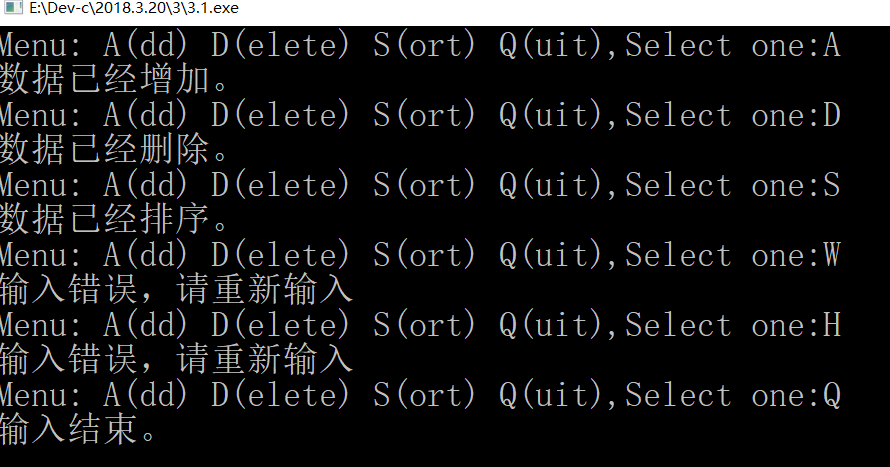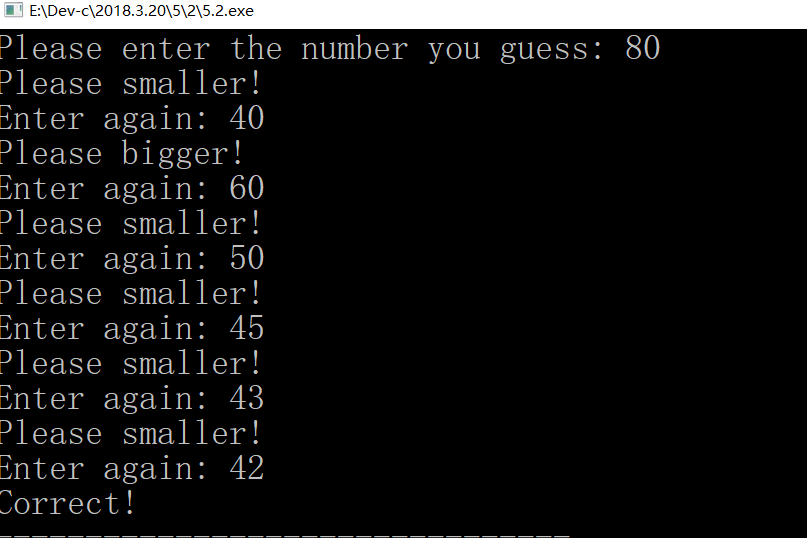1.函数声明和函数定义
拿段代码举例哈:
#include <iostream>
using namespace std;
int add(int, int);
int main()
{
int x, y;
cin >> x >> y;
cout << add(x, y);
return 0;
}
int add(int a, int b)
{
return a+b;
}
函数声明,在我看来便是在系统中声明一个函数,告诉系统从现在开始,有了这个函数,可以对它进行调用,如上述函数中最上方的int add,即是声明add函数;
而函数定义,则是向系统具体阐释这个函数是做什么的,功能是什么,如上述函数中最后的int add,是告诉系统add函数要求a+b的值,而我觉得,int main说白了也是对main函数的一种定义;
还有,函数声明可以和函数定义结合在一起,即将函数声明删去,将函数定义移至上方主函数前即可。
2.实参形参,函数参数与返回值的作用
还是上面那串代码:
#include <iostream>
using namespace std;
int add(int, int);
int main()
{
int x, y;
cin >> x >> y;
cout << add(x, y);
return 0;
}
int add(int a, int b)
{
return a+b;
}
形参,即形式参数,只是走个形式,在我看来就是一个一次性参数,只有在定义它的这个函数中,需要的时候,才会给它分配空间,使用结束即释放空间,这个函数结束后在主函数及其他函数中无法使用,正如上述代码中的a,b,add函数结束后就无法再使用;
实参,是一个固定的值,可以是常量,变量,函数,表达式等等,一般是先通过赋值,输入等方法获得固定值,再传给形参,就如代码中的x和y,通过输入获得固定值,再传给形参a和b;
函数的参数,就是函数从外界主函数中获得解决这个函数问题需要的条件的桥梁,代码中的a和b就是获得输入值的途径;
函数的返回值,就是函数解决的问题的答案,通过这个返回值传回给主函数进行进一步加工处理,代码中就是通过返回值a+b将答案返回主函数。
3.值传递
#include <iostream>
using namespace std;
void swao(int,int);
int main()
{
int x=1, y=2;
cout << "x= " << x <<< ", " << "y= " << y << endl;
swap(x,y);
cout << "x= " << x << ", "<< "y= " << y;
return 0;
)
void swap(int a, int b) { int m; m = a; a = b; b = m; )
结果: x= 1, y= 2
x= 1, y= 2
像代码中a=b之类的都属于直接的值传递,是直接将一个值通过赋值传给另一个变量,并不会改变函数外的原值;
#include <iostream>
using namespace std;
void swao(int *,int *);
int main()
{
int *x=1, *y=2;
cout << "x= " << x <<< ", " << "y= " << y << endl;
swap(*x,*y);
cout << "x= " << x << ", "<< "y= " << y;
return 0;
)
void swap(int *a, int *b)
{
int m;
m = a;
a = b;
b = m;
)
结果: x= 1, y= 2
x= 2, y= 1
间接传递则是可以改变原变量的位置来改变它的值,可以影响函数外的原值;
2-28
//if else
#include <iostream>
using namespace std;
void fun();
int main()
{
fun();
return 0;
}
void fun()
{
char ch;
while(ch!='Q')
{
cout<<"Menu: A(dd) D(elete) S(ort) Q(uit),Select one:";
cin>>ch;
if(ch=='A'){
cout<<"数据已经增加。"<<endl;
continue;
}
else if(ch=='D'){
cout<<"数据已经删除。"<<endl;
continue;
}
else if(ch=='S'){
cout<<"数据已经排序。"<<endl;
continue;
}
else if(ch=='Q'){
cout<<"输入结束"<<endl;
break;
}
else{
cout<<"输入错误,请重新输入"<<endl;
continue;
}
}
}

//switch
#include <iostream>
using namespace std;
void choose();
int main()
{
choose();
return 0;
}
void choose()
{
char ch;
while(ch!='Q')
{
cout<<"Menu: A(dd) D(elete) S(ort) Q(uit),Select one:";
cin>>ch;
switch (ch){
case 'A':
cout<<"数据已经增加。"<<endl;
break;
case 'D':
cout<<"数据已经删除。"<<endl;
break;
case 'S':
cout<<"数据已经排序。"<<endl;
break;
case 'Q':
cout<<"输入结束。"<<endl;
break;
default:
cout<<"输入错误,请重新输入"<<endl;
break;
}
}
}

2-29
判断素数:一个素数只有1和它本身两个因数,所以从2开始只有它本身一个因数。那么从2开始检索它的第一个因数,若为它本身,则它是素数,反之则不是;
//for
#include <iostream>
#include <cmath>
using namespace std;
void search();
int main()
{
search();
return 0;
}
void search()
{
int i,j;
for(i=2; i<100; i++)
{
for(j=2; j<=i; j++)
if(i%j==0) break;
if(j==i)
cout<<i<<' ';
else
continue;
}
}

//while
#include <iostream>
#include <cmath>
using namespace std;
void search();
int main()
{
search();
return 0;
}
void search()
{
int i=1,j;
while(i++ < 100)
{
j=1;
while(++j <= i){
if(i%j==0) break;}
if(j==i)
cout<<i<<' ';
else
continue;
}
}

//do while
#include <iostream>
#include <cmath>
using namespace std;
void search();
int main()
{
search();
return 0;
}
void search()
{
int i=2,j;
do
{
j=2;
do{
if(i%j==0) break;
}while(j++ < i);
if(j==i)
cout<<i<<' ';
else
continue;
}while(i++ < 100);
}

显而易见,for循环最快,while循环次之,dowhile循环最慢。
2-32
//do while
#include <iostream>
#include <cstdlib>
using namespace std;
void game();
int main()
{
game();
return 0;
}
void game()
{
int target, answer;
target = 1 + rand()%100;
cout << "Please enter the number you guess: ";
do{
cin >> answer;
if(answer == target)
cout << "Correct!";
else if(answer < target)
cout << "Please bigger!" << endl << "Enter again: ";
else
cout << "Please smaller!" << endl << "Enter again: ";
}while(answer != target);
}

//while
#include <iostream>
#include <cstdlib>
using namespace std;
void game();
int main()
{
game();
return 0;
}
void game()
{
int target, answer = -1;
target = 1 + rand()%100;
cout << "Please enter the number you guess: ";
while(answer != target)
{
cin >> answer;
if(answer < target)
{
cout << "Please bigger!" << endl << "Enter again: ";
continue;
}
else if(answer > target)
{
cout << "Please smaller!" << endl << "Enter again: ";
continue;
}
}
cout << "Correct!";
}

3-34
思路:高中时做过类似的摸球的概率计算,一共n个球,若摸可能不同颜色的,第一次n种可能,第二次n-1种,···,第x次n-(x-1)种,由于是1次摸完,所以再除去顺序,除以x!,得到结果
//摸球游戏
#include <iostream>
using namespace std;
void moqiu();
int main()
{
moqiu();
return 0;
}
void moqiu()
{
int sum=1, aim, total;
cout << "The total number of kinds is: ";
cin >> total;
cout << endl << "The number of balls you choose is: ";
cin >> aim;
for(int i=1; i <= aim; i++ )
{
sum *= (total-(i-1));
sum /= i;//除去摸球顺序影响
}
cout << endl << "The number of posibility is: " << sum;
}
